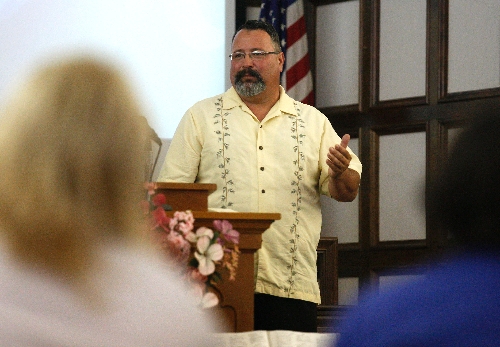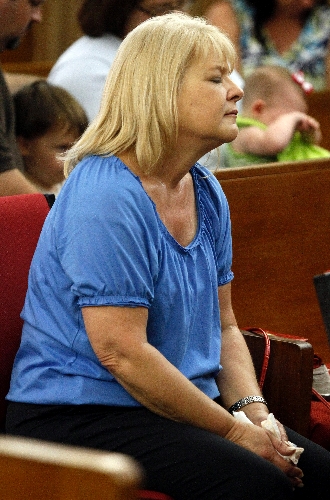‘Green religion’ adds converts
NEW ORLEANS -- Where would Jesus drill?
Religious leaders who consider environmental protection a godly mission are making the Gulf of Mexico oil spill a rallying cry, hoping it inspires people of faith to support cleaner energy while changing their personal lives to consume less and contemplate more.
"This is one of those rare moments when you can really focus people's attention on what's happening to God's creation," said Walt Grazer, head of the National Religious Partnership for the Environment.
Activists in the movement often described as "green religion" or "eco-theology" are using blogs and news conferences to get the word out. Some are visiting the Gulf, inspecting oil-spattered wetlands and praying with idled fishermen and other victims.
And believers in the stricken coastal regions are looking at the consequences of the oil's reach and asking what good can come out of it.
During worship services on a recent Sunday, the Rev. Eddie Painter of Barataria Baptist Church in the fishing village of Lafitte, La., told his congregation a silver lining in the tragedy might be renewed government commitment to restoring the region's battered coastal marshlands.
"I actually didn't think I would be as deeply affected as I was by seeing oil in the water, the birds with oil stains, the marsh grass that had turned a shiny brown," said the Rev. Jim Ball of the Evangelical Environmental Network, who recently toured Louisiana's Barataria Bay by boat.
Organizations including the National Council of Churches and the U.S. Conference of Catholic Bishops have issued statements calling for soul-searching. Some are providing ecologically themed online resources -- prayers, liturgy, scripture readings -- for use in worship services.
"We have used God's creation without regard for the impact our rapacity had on the other creatures with whom we share our earthly home," reads a model prayer on the Council of Churches' website.
The push for an ecological Great Awakening since the oil spill began in April has come from liberals as well as theologically conservative groups such as the Evangelical Environmental Network, which previously sponsored an ad campaign with the slogan "What Would Jesus Drive?" that called for more fuel-efficient vehicles.
In a resolution this month, the Southern Baptist Convention declared that humanity's "God-given dominion over the creation is not unlimited, as though we were gods and not creatures" and called for "energy policies based on prudence, conservation, accountability and safety."
"Caring for creation is an extension of loving your neighbor as yourself," said Russell Moore, dean of Southern Baptist Seminary in Louisville, Ky., who wrote the statement.
Disagreements persist, especially regarding public policies such as climate-change legislation.
Painter, the Lafitte preacher, criticized the Obama administration's fight for a moratorium on offshore drilling, saying it would worsen unemployment in the struggling community.
"I think we're called to be good stewards of God's creation," said Painter, who's also a part-time crab fisherman. "But I have no patience with people who are using the situation to push a political agenda."
But some scholars say their response to the oil spill at least suggests an emerging agreement that environmental issues are fair game in houses of worship where they were long ignored.
"Very few of the world's religions were making any statements about the environment 20 years ago, and now virtually all of them have," said Mary Evelyn Tucker, a historian of religion and founder of Yale University's Forum on Religion and Ecology. "The challenge is to put them into practice."
Even people with no specific religious beliefs are recognizing a spiritual dimension in the Gulf tragedy and taking a deeper look at their energy use, Tucker said.
"There is a yearning for meaning and purpose and being able to contribute to something larger than ourselves," she said.
The disaster may help replace longstanding divisions based on dogma or culture with "a new kind of consensus that isn't liberal or conservative, left or right, but focuses on stewardship of creation, care for the poor and accountability for corporate leaders," Wallis said.
Moore, a native of "God-fearing, pro-defense, Republican-voting" Biloxi, Miss., said the creation care message is resonating in his home state as oil spoils its Gulf coastline and batters its economy.
For progressive believers, it's an easy sell. But many conservatives consider eco-theology a distraction from the church's primary mission of winning souls -- or even a stalking horse for socialism or earth worship.
In Louisiana, where loyalty to the oil and gas industry remains strong despite the BP disaster, opposition to fossil fuels sometimes doesn't go over well.
"God put the oil there. He put it there for us to take dominion over and use responsibly," said Gene Mills, director of the Louisiana Family Forum.
Ball said it's understandable that some believers would embrace creation stewardship in theory while resisting specific measures that change their way of life. But making fundamental change is what religious commitment is all about, he added.
"As Christians, we have the freedom to do God's will," he said. "We're not helpless, we're not hopeless."























